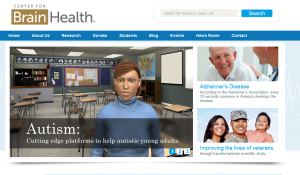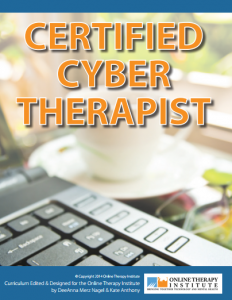 Each day, when I arrive at work, I set out to plan a therapy session that will impact and influence the lives of my patients. As a project coordinator of a research study, there are countless tools at my disposal and each one provides an opportunity to facilitate and measure change. It’s up to me to choose the method that I believe provides the best outcome. For me, my tool of choice is a unique online virtual reality program, which provides social training to individuals with autism spectrum disorders. Using this technology I act as part therapist, part research scientist, part community liaison, and part member of a digital development team. Having this virtual tool allows me to seamlessly take on each role with dedicated purpose to help my patients recognize their own social roles that can connect them to their daily life.
Each day, when I arrive at work, I set out to plan a therapy session that will impact and influence the lives of my patients. As a project coordinator of a research study, there are countless tools at my disposal and each one provides an opportunity to facilitate and measure change. It’s up to me to choose the method that I believe provides the best outcome. For me, my tool of choice is a unique online virtual reality program, which provides social training to individuals with autism spectrum disorders. Using this technology I act as part therapist, part research scientist, part community liaison, and part member of a digital development team. Having this virtual tool allows me to seamlessly take on each role with dedicated purpose to help my patients recognize their own social roles that can connect them to their daily life.
As I begin each day, thinking about my patients as a therapist, each one has their own unique circumstances and situation in life. One may be in college looking to make a friend, one may be graduating high-school and worried about their next steps in life, and one may be struggling to interview for a job. My role is to take each person’s story and create a social practice session that is meaningful to them. The training must come alive through the unscripted conversation of an avatar and must be standardized enough to follow the research study guidelines. Using the online tool enhances the social practice and eliminates extra effort on my part to help the participants “feel” the realism of a conversation. They become immersed in practice allowing me to step back and simply guide their improvement by giving feedback of how they are progressing.
… read the complete story ~ http://issuu.com/onlinetherapyinstitute/docs/titliss10/52
This article first appeared in the Spring 2012 issue of TILT Magazine ~ Therapeutic Innovations in Light of Technology.
Click here to read the entire PDF version of the Day in the Life of an Online Therapist article.
Tandra Allen is project coordinator at The Center for BrainHealth at the University of Texas at Dallas. Her work at the Center focuses on evaluating and treating social cognitive disorders in children and adults. She has over 9 years clinical experience as a speech-language pathologist working and residing within Dallas, Texas. Her work with the social cognition research study is featured on The Center for BrainHealth website: centerforbrainhealth.org.


